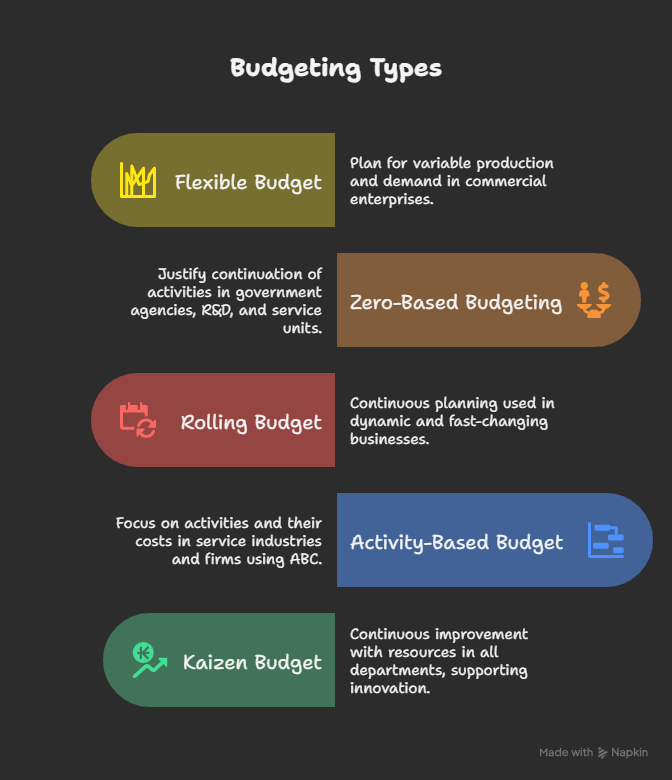Types of Budgets
📌 Why Different Types of Budgets?
Organizations face different operational needs, resource constraints, and external uncertainties.
To address this, multiple budgeting approaches are adopted, each with a distinct purpose.
1. Flexible Budget
- Used when there is high demand or production volatility.
- Allows budgeting at various capacity levels without redoing the full process.
- Common in commercial enterprises.
- Example: Budget for 60%, 80%, and 100% utilization scenarios.
2. Zero-Based Budgeting (ZBB)
- Every budget cycle starts from scratch (zero base).
- Continuity of each activity must be justified, regardless of past allocation.
- Common in:
- Government projects (e.g., yearly evaluation of a 5-year polio campaign).
- R&D functions and service departments in private companies.
- Promotes discipline and accountability in budgeting.
3. Rolling or Continuous Budget
- Budget is updated periodically (e.g., quarterly) to cover the next 12 months.
- Encourages budgeting as an ongoing, integrated process.
- Helps adapt to changing business conditions throughout the year.
4. Activity-Based Budgeting (ABB)
- Based on the Activity-Based Costing (ABC) approach.
- Useful when conventional input-based budgeting fails (especially for service firms).
- Focuses on cost of activities, not just inputs like raw material or labour.
-
Steps in ABB:
- Identify activities and calculate cost per activity.
- Estimate demand for activities based on targets.
- Compute budgeted cost of each activity.
- Consolidate into a total budget.
5. Kaizen Budgeting
- “Kaizen” = Continuous improvement.
- Every department must present:
- Planned improvements
- Resources needed (training, equipment, etc.)
- Budget performance is measured by:
- Achievement of targets
- Improvements made
- Makes budgeting forward-looking and development-oriented.
Combining Budgeting Approaches
Different budgets can be used together to enhance effectiveness:
- Zero-Based + Flexible Budget → For departments like R&D or Branding
- Kaizen Budgeting → Can be added to any type of budget
- Activity-Based Budgeting + Flexible Budget → Prepare flexible budgets for each activity


No Comments